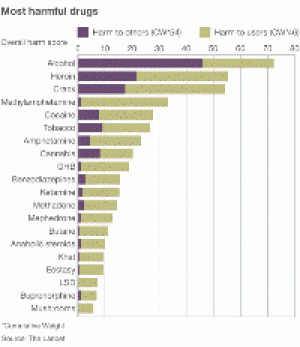Consequences of Prohibition
Drug War Issues
Politics & Advocacy
A study published Monday in the Lancet assessed the harms of various substances and found that alcohol caused more harm in the United Kingdom than heroin or crack cocaine. The study was done by the Independent Scientific Committee on Drugs, which is headed by Professor David Nutt.

drug harm comparison chart, from the Lancet study
The study, Drug Harms in the UK: A Multicriteria Decision Analysis, assessed the relative harms of different legal and illegal drugs to drug users and to society and concluded that "alcohol was the most harmful drug (overall harm score 72), with heroin (55) and crack (54) in second and third places."
It also demonstrated that Britain's drug classification scheme bears little relation to the harms caused by the various substances it regulates or fails to regulate. Alcohol, ranked most harmful in the study, is not a controlled substance, but cannabis (20 points) is Class B, the second most serious drug schedule. LSD (7 points) is a Class A drug, the most serious drug schedule, while tobacco (26 points) is not a controlled substance.
"Our findings lend support to previous work in the UK and the Netherlands, confirming that the present drug classification systems have little relation to the evidence of harm," the authors said.
A group of experts looked at drug-specific mortality, drug-related mortality, drug-specific damage, drug-related damage, drug-specific impairment of mental functioning, drug-related impairment of mental functioning, loss of tangibles, loss of relationships, injury, crime, environmental damage, family adversities, international damage, economic cost, and harm to the community and assessed weighted values for each to arrive at a final figure.
"The weighting process is necessarily based on judgement, so it is best done by a group of experts working to consensus," Nutt and his coauthors said. "Extensive sensitivity analyses on the weights showed that this model is very stable; large changes, or combinations of modest changes, are needed to drive substantial shifts in the overall rankings of the drugs."
Science-based drug policy, anybody?
This work by StoptheDrugWar.org is licensed under Creative Commons Attribution-ShareAlike 4.0 International
Comments
hey
i don't know if i'm the only crazy one here, but if a substance is regulated and controlled by the government, isn't it de facto legalized? why are these asshholes .... ugh. i guess not all of us can have common sense.
In reply to hey by Anonymous1 (not verified)
RE: hey
Why cannabis (8th) rated only 25% less harmful than tobacco (6)?
Sorry, I didn't sign in at the study and read beyond the abstract. But I wonder if these authors overlooked the prevalent practice-- some say 2/3 of users-- in UK and Europe of mixing cannabis with tobacco in the same joint (in the Dutch language Wikipedia article on "joint" someone parades as historic truth the idea that the word "joint" actually refers to this joining of cannabis and tobacco).
From the drug synergy of cannabis and tobacco, along with all the extra heat shock and carbon monoxide from using the faulty hotburning cigarette paper delivery system, doubtless arise symptoms of behavior and character damage that the public is routinely attributing to the cannabis. The only fair way of testing harmfulness of cannabis would be to study only subjects who properly used a vaporizer (oops, vapouriser) or a 25-mg. one-hitter.
That this issue has political implications can be seen from the fact that right wing talk show hosts (rwtsh)routinely spewed warnings of worker incompetence, dozing-off at school and other alleged "drug effects" of cannabis which would be inflicted on society if Prop.19 passed.
I Call Foul!
Ok, I registered at The Lancet and read most of the study... I had to stop when I read the cannabis fatality rates. NO ONE HAS EVER DIED SOLELY FROM CANNABIS. Go ahead and see if you can prove me wrong, but from all the other studies I've read, no one has been able to determine how much cannabis you'd have to consume/smoke/vape in order for it to prove lethal. The study states: We also investigated drug-specific mortality estimates in studies of human beings. These estimates show a strong correlation with the group input scores: the mean fatality statistics from 2003 to 2007 for five substances (heroin, cocaine, amfetamines, MDMA/ecstasy, and cannabis) show correlations with the ISCD lethality scores of 0·98 and 0·99, for which the substances recorded on the death certificates were among other mentions or sole mentions, respectively.
I just hope that the study found that cannabis was only one of other substances on the death certificate, but unfortunately the study doesn't go into that much detail. This is an extreme disservice to the truth about cannabis and the war on drugs.
I Call Foul!
Ok, I registered at The Lancet and read most of the study... I had to stop when I read the cannabis fatality rates. NO ONE HAS EVER DIED SOLELY FROM CANNABIS. Go ahead and see if you can prove me wrong, but from all the other studies I've read, no one has been able to determine how much cannabis you'd have to consume/smoke/vape in order for it to prove lethal. The study states: We also investigated drug-specific mortality estimates in studies of human beings. These estimates show a strong correlation with the group input scores: the mean fatality statistics from 2003 to 2007 for five substances (heroin, cocaine, amfetamines, MDMA/ecstasy, and cannabis) show correlations with the ISCD lethality scores of 0·98 and 0·99, for which the substances recorded on the death certificates were among other mentions or sole mentions, respectively.
I just hope that the study found that cannabis was only one of other substances on the death certificate, but unfortunately the study doesn't go into that much detail. This is an extreme disservice to the truth about cannabis and the war on drugs.
Add new comment